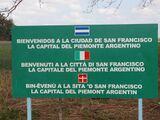Flag icons for languages

The use of flag icons, particularly national flags, for languages is a common practice. Such icons have long been used on tourist attraction signage, and elsewhere in the tourism space, but have found wider use in website localization where UX limitations have become apparent.[1][2]
The usage remains widespread despite problems, such as being potentially insulting, since countries and languages don't have a one-to-one correspondence. The World Wide Web Consortium suggests not using such practice, and recommends using texts instead.[3][4]
Types of flags icons
National flags
National flags are the most commonly used flag icons for representing languages. They are generally chosen because they either represent the language's origin (e.g. the flag of Spain used over the flag of Mexico) or the highest number of native speakers (e.g. the flag of the United States over the Flag of England).
-
The flag of Spain is often used to represent Spanish, despite having fewer native speakers than Mexico
-
The flag of United States is often used to represent English, despite not being its origin
Mixed national flags
A diagonally divided flag between two or more nation states are sometimes used when more than one country is a major user of a language. Examples of this are the flags of the United Kingdom, the United States and Canada to indicate the English language, the flags of China and Taiwan to represent Mandarin, the flags of France, Belgium, and Canada to represent the French language, the flags of Spain and Mexico to represent the Spanish language, and the flags of Portugal and Brazil to represent the Portuguese language.[5][6]
-
A mixed national flag of the US and the UK, representing English
-
A mixed national flag of France, Canada and Belgium, representing French
-
A mixed national flag of Spain and Mexico, representing Spanish
-
A mixed national flag of Portugal and Brazil, representing Portuguese
Linguistic flags
Some international linguistic communities have flags which encompass all the speakers of a language while avoiding the symbolism of national flags, though they are not as widely recognized.[7]
-
The flag of the International Organisation of La Francophonie, representing French
-
The flag of the Community of Portuguese Language Countries, representing Portuguese
-
The Verda Stelo flag, representing Esperanto
Writing systems
National flags can also be used to distinguish between different written standards for a single language. For example, the flag of Taiwan is often used for Traditional Chinese and the flag of the People's Republic of China for Simplified Chinese.[8]
-
Flag of Taiwan, representing Traditional Chinese
-
Flag of China, representing Simplified Chinese
Political motivations

Some Euronet ATMs (automated teller machines) display the Irish flag as a symbol for the English language (usually UK flag or English flag). This was speculated to be a response to Brexit, with the Republic of Ireland as one of the only two remaining European Union member nations (along with Malta) with English among their official languages. The Irish flag is more commonly used to signify the Irish language.[9]
Gallery
-
Sign in San Francisco, Córdoba, Argentina; unusually, the Spanish language is indicated by an Argentine flag, while below it is Italian and Piedmontese text with the flags of Italy and Flag of Piedmont.
-
Sign in Guernsey using the Flag of Guernsey to symbolise Guernésiais.
References
- ↑ Meloni, Julie C. (May 25, 2012). Sams Teach Yourself PHP, MySQL and Apache All in One: STY PHP, MySQL Apache AIO_p5. Sams Publishing. ISBN 9780132603645. https://books.google.com/books?id=FbEXG8ZnxPUC&dq=%22flag+to+represent+language%22&pg=PA535.
- ↑ Cronin, Blaise (March 23, 2004). Annual Review of Information Science and Technology. Information Today, Inc.. ISBN 9781573872096. https://books.google.com/books?id=P7zxudnqdzMC&dq=%22flag+to+represent+a+language%22&pg=PA284.
- ↑ Měchura, Michal (29 July 2009). "Flags as language symbols – so what is the problem?". https://www.lexiconista.com/flags-as-language-symbols/.
- ↑ "Internationalization Best Practices: Specifying Language in XHTML & HTML Content". World Wide Web Consortium. https://www.w3.org/International/geo/html-tech/tech-lang.html#ri20040808.173208643.
- ↑ Grainger, Jonathan (July 20, 2017). On national flags and language tags: Effects of flag-language congruency in bilingual word recognition. Acta Psychologica. https://www.sciencedirect.com/science/article/pii/S000169181730029X.
- ↑ Guilherme, Manuela; Souza, Lynn Mario T. Menezes de (February 6, 2019). Glocal Languages and Critical Intercultural Awareness: The South Answers Back. Routledge. ISBN 9781351184632. https://books.google.com/books?id=c8yGDwAAQBAJ&dq=%22Portuguese+flag%22+Language&pg=PT185.
- ↑ Heritage, Canadian (August 15, 2017). "Flags of La Francophonie". https://www.canada.ca/en/canadian-heritage/services/flags-francophonie.html.
- ↑ Graff, Roy; Parulis-Cook, Sienna (July 9, 2019). China, the Future of Travel. Lulu.com. ISBN 9780244800529. https://books.google.com/books?id=A9OmDwAAQBAJ&q=+%22traditional+chinese%22&pg=PA48.
- ↑ McNally, Frank. "English Stew – Frank McNally on a meeting of the anglophone world in Limerick". https://www.irishtimes.com/opinion/english-stew-frank-mcnally-on-a-meeting-of-the-anglophone-world-in-limerick-1.3931097.
External links
 |















